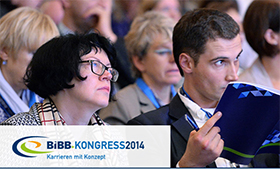President Esser: “New impetuses for dialogue across all areas of education and training”
Conclusion of the BIBB Congress in Berlin
43/2014 | Bonn, 19.09.2014

“A permeable educational system needs to fulfil all the prerequisites in terms of ensuring that access points to the respective courses are open to everyone and that individuals can switch between such courses without difficulty,” said Friedrich Hubert Esser, President of the Federal Institute for Vocational Education and Training (BIBB), on the occasion of the conclusion BIBB Congress in Berlin. “In order for this to take place, schools, institutes of higher education and the VET sector need to work together to develop forms of advice and support to facilitate the right and best educational and occupational pathway for everyone. This congress has set new impetuses for dialogue across all areas of education and training.” Over the two days of the event, which was staged under the motto of “Structuring vocational education and training in a more attractive way – facilitating greater permeability”, more than 800 participants from 35 countries debated the future shaping of the educational and vocational education and training system.
Representatives from schools, higher education and vocational education and training all agreed that the main focus in future needed to be on continuing to remove the barriers blocking access to the respective educational and training courses in order to make it possible for everyone to take part in courses and examinations in future. “In light of the uncertainty surrounding the world of work and their own uncertainty regarding career preferences, young people do not wish to commit themselves too early”, stressed Esser. “A permeable educational system needs to take this into account and offer individuals opportunities and support in situations such as returning to organised learning after a phase of work or family responsibility in order to update or expand their competences.”
Professor Esser felt that the papers, discussions and good practice examples at the BIBB Congress had shown that this would have to have consequences for the transparency, the quality assurance and the certification of education and training provision. “For this reason, the tasks for all stakeholders and partners from all areas of education and training will be to work together to develop curricular bridges, funding and advisory provision and competence assessment procedures”, he went on. “A permeable educational system which permits this is the best guarantee that we will be able to tap into all areas of potential.”
Reprint free of charge – voucher copy requested.